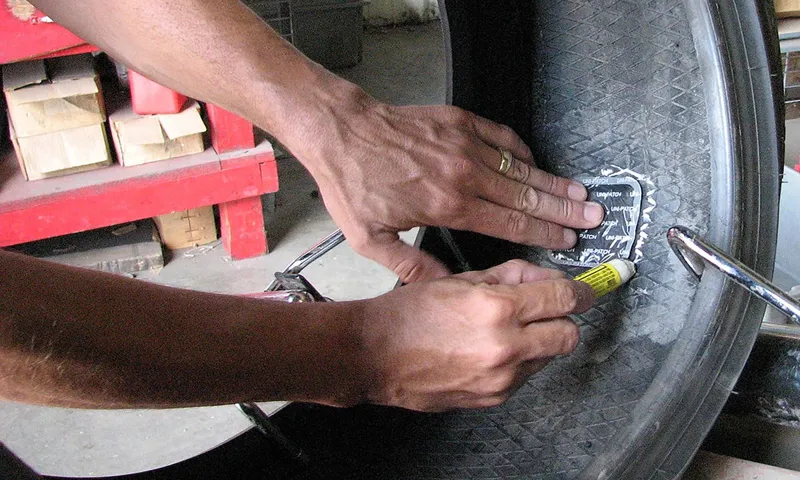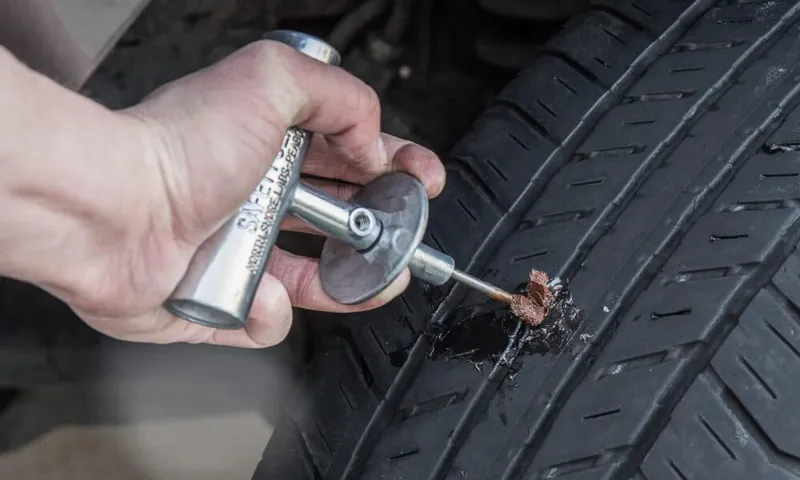Tire repair cost can put a dent in your wallet if you don’t stay on top of it. These costs can be due to a variety of factors, such as the type of tire, the size of the damage, and even the location of the repair shop. It’s important to understand the basic costs of tire repair, so you can make an informed decision about whether to fix or replace your tire.
In this blog post, we’ll explore the different factors that influence tire repair cost, provide some tips on how to save money, and examine the pros and cons of different repair options. Whether you’re a seasoned driver or a new car owner, this post is for anyone looking to save money and stay safe on the road.
Table of Contents
Factors That Affect Tire Repair Cost
Tire repair costs can vary depending on several factors. The extent of damage, type of vehicle, and location can all impact how much you’ll pay to repair a tire. For example, a minor puncture can usually be fixed by patching the hole, which won’t cost as much as a larger puncture that requires a full replacement.
Furthermore, different types of vehicles require different types of tires, which can also affect the cost of repair. High-performance tires, for instance, can be more expensive than standard tires. Finally, the cost of tire repair can also depend on where you live.
Mechanics in some areas may charge more for services than in others. Overall, tire repair costs can range from $20 to $200 or more depending on the variables involved. It’s always best to check with a professional mechanic to get accurate quotes for your specific repair needs.
Type of Tire Damage
When it comes to tire damage, there are several types to consider. Punctures, cuts, and sidewall damage are just a few examples of issues that can occur. The type of damage affects the cost of tire repair in many ways.
For example, if the puncture is in the tread of the tire, it may be repairable, but if it is on the sidewall, the tire will likely need to be replaced. Additionally, the size and depth of the damage will impact the repair cost. Larger or deeper cuts may require a patch or plug in addition to the typical repair.
The type of tire also plays a role in the cost of repair; high-performance or specialty tires may be more expensive to service. Ultimately, it is best to have a professional assess the damage and provide an estimate for repair or replacement. Remember, taking care of tire damage early on can save you money in the long run and keep you safe while driving.

Tire Type and Size
When it comes to tire repair, one of the biggest factors that can affect the cost is the type and size of the tire. The larger the tire, the more expensive it tends to be to repair or replace. Additionally, different tires have different repair options, and some may not be repairable at all.
For example, a tire with a sidewall puncture may need replacement rather than repair, while a tire with a simple nail in the tread can typically be patched up. It’s important to note that if the tire is a specialty type such as run-flat or low profile, it may also cost more to repair or replace. Ultimately, the costs of tire repair depend on a variety of factors, so it’s always best to consult with a professional tire shop to get an accurate estimate.
By understanding some of the key factors that affect tire repair costs, you can make more informed decisions about your vehicle maintenance and ensure that your tires are in top shape for safe driving.
Location and Labor Costs
When it comes to tire repair costs, there are various factors that can affect the final price. One of the primary factors is location. Depending on where you live, the cost of tire repair services can differ significantly.
For instance, big cities tend to have higher labor costs for tire repair than rural areas. This is due to the high cost of living and increased competition for skilled technicians in these cities. Another factor that affects tire repair cost is labor costs.
Labor constitutes a significant portion of the total cost of tire repair. The more experienced the technician, the higher the cost of labor. Also, the type of tire damage will determine how much it will cost to repair.
If the problem requires a simple patch, the cost will be lower than if it requires a complete replacement. It is crucial to work with a reputable tire service provider that offers fair pricing and quality services.
Average Cost of Tire Repair
When it comes to repairing a tire, the cost can vary depending on the severity of the damage. In general, repairing a tire can cost anywhere from $20 to $40, but it can be higher if the damage is more extensive. For minor issues like a puncture or small hole, a tire repair kit may be all that is needed and can cost as little as $
For more serious issues like a large puncture or sidewall damage, a tire replacement may be necessary which can cost anywhere from $100 to $300 or more. It’s important to address tire damage as soon as it’s noticed to prevent further damage or potential blowouts. Regular maintenance can also help prevent tire damage and prolong the life of your tires.
Puncture Repair Cost
When you have a puncture in your car tire, the cost of repair can be a concern. On average, the cost of tire repair depends on several factors, such as the type of tire you have, the extent of the damage, and the location of the puncture. In general, the average cost of tire repair ranges from $10 to $30.
However, the cost could be higher if you have special tires or if your tire has extensive damage. It’s important to note that not all punctures can be repaired. If the damage is too severe, you may have to replace the tire entirely, which could cost you more.
To help prevent punctures, make sure to maintain proper tire pressure, avoid driving over sharp objects, and regularly inspect your tires. Remember, investing in tire maintenance can save you money in the long run.
Sidewall Repair Cost
When it comes to repairing a sidewall on your tire, the cost can vary depending on a few different factors. On average, you can expect to pay anywhere from $50 to $150 for a sidewall repair, which includes patching up any damages or holes that may have occurred. However, if the damage is severe and the sidewall needs to be replaced entirely, the cost can rise to $200 or more.
Keep in mind that the cost may also vary depending on the type and size of the tire needing repair, as well as the region you live in. Overall, it’s important to address any sidewall damage as soon as possible to avoid further issues and prevent the cost of repair from increasing. Remember to regularly inspect your tires and have them serviced by a professional if you notice any issues, as safety should always be a top priority when it comes to your vehicle.
Tread Repair Cost
If you’ve discovered a nail or object embedded in your tire causing a slow leak, you may wonder about the cost of tread repair. The average cost of tire repair can vary depending on the severity of the tire’s damage and the repair shop’s location. In general, expect to pay anywhere from $20 to $40 for a simple puncture repair.
However, if the damage is more severe, such as sidewall damage or a large cut, the cost may increase, and in some cases, it may be more cost-effective to replace the tire altogether. Remember, driving on a damaged tire can compromise your safety and the safety of other drivers on the road, so it’s best to take care of it as soon as possible. When in doubt, consult with a trusted tire professional to evaluate the damage and make the best repair decision.
With careful attention and care, you can extend the life of your tires and save money in the long run.
When to Replace Your Tires Instead of Repairing Them
When it comes to tire damage, the first instinct may be to repair rather than replace. However, it’s important to consider how much it will cost to repair a tire versus the cost of a brand new tire. Minor damages like punctures or small cuts can typically be repaired for a reasonable price, usually ranging from $10 to $20 per tire.
However, if the tire has suffered significant damage, such as a large cut or bulging sidewall, it’s best to replace the tire altogether. Trying to repair a severely damaged tire may be more expensive in the long run and could compromise safety on the road. It’s important to remember that the safety of you and your passengers should always come first when making a decision about tire repair or replacement.
So, if you’re not sure whether to repair or replace a tire, consult with a trusted mechanic or tire specialist for a recommendation.
Safety Concerns
When it comes to the safety of your vehicle, tires play a crucial role. It’s essential to ensure that your tires are in good condition, especially if you’re frequently traveling long distances. So, when should you replace your tires instead of repairing them? In general, if your tire has a puncture, it can be repaired only if it’s located on the tread’s central area and is smaller than a quarter inch in diameter.
However, if the puncture is on the sidewall, repairing is not an option. It’s best to replace the tire immediately. Similarly, if the tire’s sidewall is cracked or damaged, it’s unsafe to repair it, and you should opt for a replacement.
In general, if your tires are more than six years old, you should replace them, even if they look fine. Aging and wear and tear can weaken the resilience of the rubber and reduce traction. Always remember, your safety should be your top priority, and it’s always better to be safe than sorry.
So don’t hesitate to replace your tires when necessary, even if it requires you to spend a little bit more money.
Tire Damage Extent and Location
As a car owner, ensuring the safety of your vehicle is a top priority. When it comes to tire damage, you may wonder if it’s better to repair or replace them. It ultimately depends on the extent and location of the damage.
If the puncture or cut is located on the sidewall or shoulder of the tire, it’s recommended to replace the tire entirely. Sidewall and shoulder damage pose a higher risk of a blowout, which could lead to a serious accident. However, if the damage is limited to the tread area and is less than a quarter of an inch in diameter, a patch or plug could be a temporary solution.
It’s important to note that repairing a tire should be a last resort and not a long-term fix. Eventually, it’s best to replace the tire to avoid any safety risks. By staying diligent with tire maintenance, you’ll potentially save yourself from costly repairs and, more importantly, ensure the safety of yourself and others on the road.
Conclusion and Final Thoughts
When it comes to repairing a tire, price is always a concern. It’s like the age-old question: How much does it cost to fill up a gas tank? It depends on where you go and what type of repair is needed. But don’t just settle for the cheapest option.
Remember, a tire is your sole connection to the road, and a poorly repaired one could put you and your passengers in danger. So, do your research, ask for recommendations, and invest in the best repair possible. Because when it comes to safety, you can’t afford to cut corners – even if your wallet begs to differ.
“
FAQs
How much does it cost to repair a tire puncture?
The cost of repairing a tire puncture can vary depending on the location and severity of the puncture, as well as the type of tire. On average, it can cost anywhere from $10 to $50 for a puncture repair.
Can a tire be repaired if it has sidewall damage?
No, sidewall damage cannot be repaired, as it compromises the structural integrity of the tire. The tire will need to be replaced.
Are there any DIY methods for repairing a tire?
While there are tire plug kits available for purchase, it is recommended to have a professional repair any punctures to ensure proper and safe repairs.
Does the type of vehicle affect the cost of tire repair?
Yes, the cost of tire repair can vary depending on the type of vehicle and its tire size.
How long does a tire repair typically take?
A simple puncture repair can usually be completed in under an hour, but it may take longer for more extensive repairs or if the tire needs to be replaced.
Is tire repair covered under warranty?
It depends on the specific warranty. Some tire warranties may cover repairs or replacements for certain types of damage, while others may not.
Can a tire with multiple punctures be repaired?
It depends on the location and severity of the punctures. A tire with multiple punctures in the same area cannot be repaired, but if the punctures are in different areas of the tire, it may be repairable.



